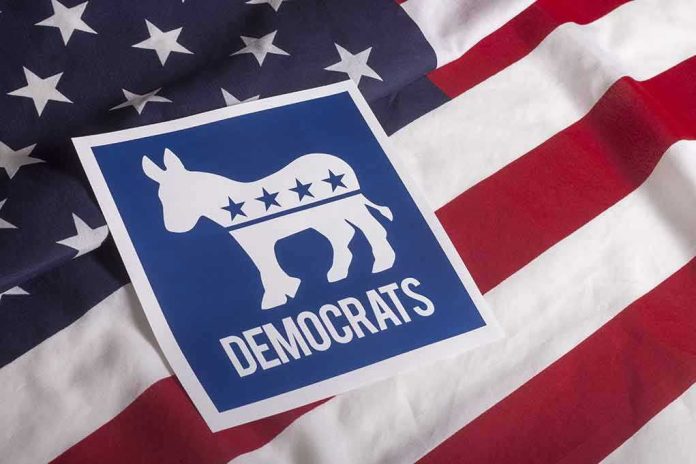
Eight kilograms of cocaine sent straight to a government office shattered the illusion that public service roles are immune to the undercurrents of organized crime, leaving Massachusetts—and anyone watching—questioning just how deep the cracks in public trust really run.
Story Snapshot
- A senior aide to Governor Maura Healey was arrested after eight kilograms of cocaine were delivered to a Massachusetts state office building.
- The accused, LaMar Cook, previously managed Hotel UMass, where another 13 kilograms of cocaine were seized earlier in the month.
- The scandal raises urgent questions about oversight, political fallout, and the vulnerability of public institutions to criminal exploitation.
- Governor Healey’s administration responded with immediate termination and public condemnation, but the investigation continues to widen.
Criminal Enterprise Behind the Statehouse Doors
LaMar Cook’s arrest for trafficking eight kilograms of cocaine delivered directly to the Springfield State Office Building forced Massachusetts residents to confront a scenario more suited to a crime thriller than a government news release. Cook, second-in-command for the Governor’s Western Mass. office, wielded authority and public trust—until law enforcement tracked suspicious packages to his desk and linked him to an earlier 13-kilogram seizure at Hotel UMass. The sheer audacity of routing such quantities through official channels hints at a criminal network unconcerned with the old boundaries between legitimate power and illicit enterprise.
Cook’s rapid termination and subsequent arraignment in Springfield underscore the shockwaves reverberating through the state’s political establishment. Law enforcement’s precise timeline—beginning with the October 10 seizure at Hotel UMass, culminating in Cook’s October 28 arrest—suggests a coordinated surveillance effort, but also exposes vulnerabilities in how public spaces, from university hotels to government offices, can be manipulated for trafficking on a grand scale.
Public Trust on the Line: Political and Institutional Fallout
Governor Maura Healey’s administration acted swiftly, calling Cook’s conduct “unacceptable” and a “major breach of the public trust.” Yet the damage radiates beyond a single firing. Critics are already dissecting the administration’s vetting and oversight practices. With Cook’s dual roles at Hotel UMass and the governor’s office, the investigation now stretches across multiple institutions, threatening to pull more actors and processes into its orbit. Political opponents seize on the scandal as proof of systemic failure, while state and local agencies brace for increased scrutiny of hiring, background checks, and internal controls.
The uniqueness of this case—cocaine trafficked through a state office by a senior aide—sets a new, troubling precedent in Massachusetts’ long history of public corruption scandals. The sheer volume of the drugs involved, and their delivery to such a visible government location, signal a level of boldness and insider access that challenges even seasoned investigators’ assumptions about criminal risk-taking in the public sector.
From Hotel UMass to State Office: Exploiting Institutional Weakness
Cook’s trajectory from director of Hotel UMass to deputy director in the governor’s regional office reveals how positions of trust and logistical control can be leveraged for criminal enterprise. Authorities believe the same mechanisms that enabled Cook to oversee hospitality operations at a major university may have facilitated the movement of narcotics—first through a campus hotel, then through a government office. This pattern forces a broader reconsideration of how institutional protocols, especially those governing mail and package deliveries, might be exploited by insiders with criminal intent.
Law enforcement’s ongoing investigation, led by Hampden County District Attorney Anthony Gulluni, is expected to delve deeper into both the trafficking network and potential institutional enablers. University and state officials have already launched parallel internal reviews, promising reforms and new safeguards. Yet the immediate question remains: How did such a large-scale operation evade detection until the packages practically landed on a government aide’s desk?
Long Shadows, Lasting Consequences: What Comes Next
Short-term, the Healey administration faces an erosion of public trust and a barrage of questions from both the media and political adversaries. Local communities, particularly in Western Massachusetts, grapple with the reality that their government buildings and university facilities have become conduits for the very drug crisis officials are sworn to fight. The wider investigation may yet ensnare additional actors or reveal deeper flaws in institutional oversight.
Long-term, the case is likely to drive new policies on official hiring, mail security, and background checks—not just in Massachusetts, but in statehouses and universities nationwide. Legal experts note the severity of the charges and the unusual, brazen method of trafficking, while political analysts warn of lasting damage to the governor’s standing if further lapses are uncovered. For a state already battling the opioid and cocaine crisis, this episode is both a cautionary tale and a call to action: Complacency is the trafficker’s most reliable accomplice.
Sources:
CBS News Boston, Oct. 29, 2025













